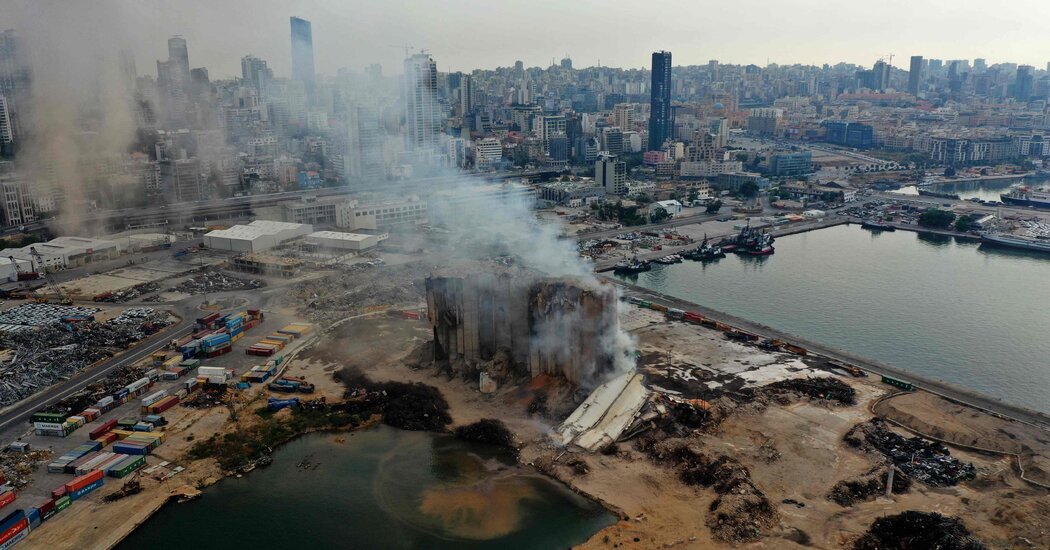Beirut Port Silos Partly Collapse on Second Anniversary of Blast

BEIRUT — On its second anniversary, the massive port explosion that rocked Beirut in 2020 was still damaging the city, as grain silos marred in the blast partly collapsed on Thursday. Nearby, thousands of people had come to mark the day and to protest the lack of accountability for the blast, which killed more than 200 people.
Thursday’s partial collapse of the grain silos came just days after another part of the silos fell and sent large plumes of gray smoke and dust over the port and nearby neighborhoods, uncomfortably reminiscent of the Aug. 4, 2020, blast cloud, which blanketed parts of the Lebanese capital two years ago.
Since then, the hulking remains of the silos have loomed over the damaged port and neighborhoods that bore the brunt of the billions of dollars in damage and destruction, a reminder of how little has improved in the wake of the blast.
Lebanese officials have been warning about the possibility of the silos collapsing for some time.
On July 25, after a fire broke out there, the ministries of environment and health issued a warning that the silos were deteriorating. The ministries advised residents to close their windows and wear face masks.
“In the event of any collapse or parts falling, dust consisting of construction waste and some fungi will be emitted from the rotting grains and will be dispersed in the air,” the ministries’ statement said. “According to expert opinion, there is no scientific evidence of the presence of asbestos or any other toxic substances.”
On Sunday, another section of the silos collapsed. In total, four parts of the silos have fallen, according to Lebanese state media.
Firefighters have been battling a fire at the port for months, said Lt. Ali Najm, spokesman for the Beirut Fire Brigade. But each time they put it out, sometimes twice a day, the fire would start again, he said.
He said he expected the remainder of the silos to fall soon.
Lea Saad, a 23-year-old architecture student, was injured in the 2020 explosion when a piece of metal tore into her back. She was on her way to the port Thursday to protest and mark the anniversary when the silos fell.
“It feels like with every silo that falls down, part of it feels like slowly you’re seeing the memory fade,” she said, adding that it was both sad and a relief.
“It is kind of erasing the memory of something that was very traumatic in a way that it is putting it under the rug as if it never existed,” said Ms. Saad, as a helicopter flew overhead with firefighters trying to extinguish the fire at the silo site.
The explosion, caused by the sudden combustion of some 2,750 tons of volatile chemicals that had been at the port for years, exposed what many Lebanese saw as decades of bad governance and corruption.
Some of those who had gathered in the latest plume of dust and smoke to blanket the port were holding signs that called for an international investigation. Some read, “Justice is coming.”
In the two years since the blast, the investigation has been plagued by controversy and criticism, and no one has yet been held responsible.
Mohamed Al Turk, a 57-year-old father of three who works for an insurance company, watched the silos collapse. He had come to the port wearing a T-shirt that read, “Justice is my demand.”
“I wish the silos were still there, because they will be the evidence of the crimes our leaders committed,” he said. “Every time they pass by here, those leaders will see the traces of their crime.”
In October, tensions over the port investigation broke out into some of the most violent clashes Beirut has witnessed in years after the judge investigating the explosion, Tarek Bitar, issued an arrest warrant for a prominent Shiite member of Parliament.
In response, Hezbollah, the Lebanese Shiite militia and political party, criticized Judge Bitar and accused him of politically targeting officials in the investigation. It called for protests, which descended into deadly violence.
Lebanon has been in a free fall since late 2019, with crippling political and economic crises leaving the Mediterranean country in a state of dysfunction. Lebanon’s currency has fallen more than 90 percent in value, leading to massive inflation and the departure of many residents who are able to leave.
Euan Ward contributed reporting from London and Hwaida Saad and Asmaa al-Omar from Beirut.
